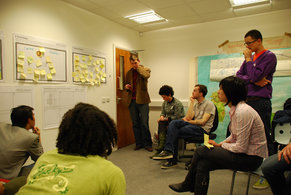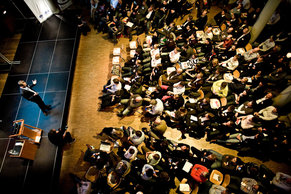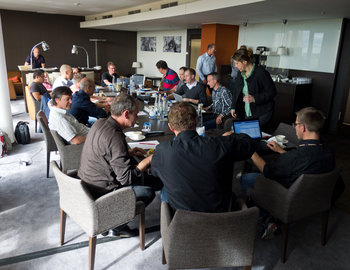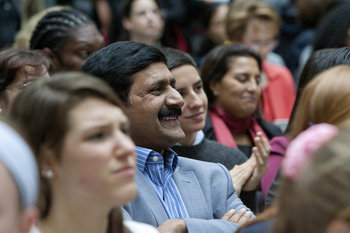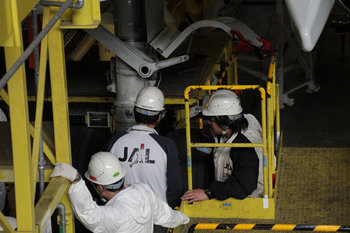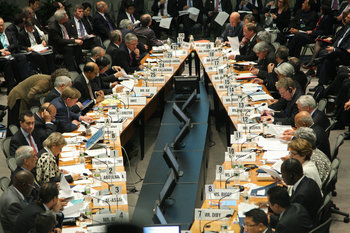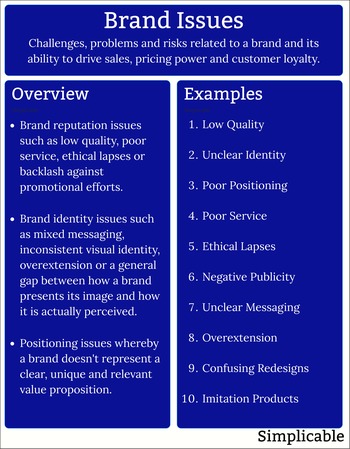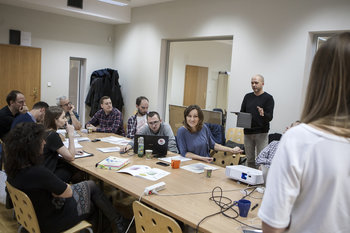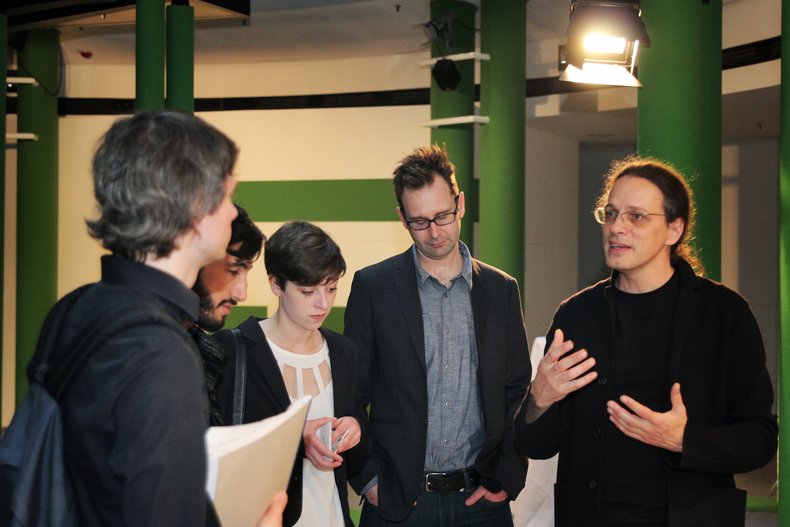
Weak Culture | Strong Culture |
Corporate Cults | Toxic Positivity |
Groupthink | Corporate Narcissism |
Ivory Tower | Politicized Culture |
Mediocrity | Consensus Culture |
Group Harmony | Saving Face |
Bureaucratic Culture | Overplanners |
Adhocracy | Command and Control |
Mushroom Management | Failure Fatigue |
Boreout | Bozo Explosion |
Charismatic Leadership / Cult of Personality | Strong Leadership |
Authoritarian Culture | Clan / Family Culture |
Customer Culture | Mission Culture |
Paternalistic Culture | Company Worker Culture |
Monitoring Culture | Micromanagement |
Management by Performance | Genchi Genbutsu |
Expert Culture | Generalist Culture |
Design Culture | Market Culture / Competitive Meritocracy |
Status Culture | Catfish Management |
High Performance Culture | Cosmopolitan Culture / Motley Crew |
Entrepreneurial Culture | Creative Culture |
Weak Culture
An organization of individuals with little unifying culture. This is typically due to a lack of shared experience such as a restaurant with staff who barely know each other due to part-time hours, shift work and turnover.Strong Culture
An organization with deep history and intensive shared experience such that its culture shapes behavior. This can make it difficult for experienced professionals from other firms to fit in.Corporate Cults
A culture that appears to be excessive, bizarre, dark and invasive from the perspective of an objective observer but insiders are unusually committed.Toxic Positivity
A culture based on toxic positivity such as glittering generalities and thought terminating cliches that are detached from reality. For example, a firm where everyone talks about being customer-obsessed that has poorly designed products and unhappy customers.Groupthink
A culture that has adopted values, principles, assumptions and politics with ideological zeal. Challenges to the status quo aren't tolerated. Unresponsive to change.Corporate Narcissism
Corporate narcissism is when a high status firm suffers from overconfidence and self-absorption. Unresponsive to the needs or demands of customers, partners, regulators and investors.Ivory Tower
A firm lead by narcissistic or aloof leaders who are disconnected from frontline realities.Political Culture
A firm that is obsessed with office politics that are highly abstracted from business results. For example, promotions based on political wins that have little revenue or customer impact.Mediocrity
A conflict-avoiding culture where employees try to do the minimum required not to be let go.Consensus Culture
A type of mediocrity where groups try to avoid conflict by not doing anything without a group consensus. This suffers from the abilene paradox whereby strategy and decisions are likely to be fully irrational.Group Harmony
A culture that prioritizes getting along and being polite. This is likely to preserve the status quo and result in slow decisions and low work throughput. The lack of creative tension in this environment makes creativity unlikely.Saving Face
Saving face is a culture that avoids embarrassing people. This results in low/indirect criticism and may allow mediocrity to thrive.Bureaucratic Culture
A culture of mature processes, procedures and policy where controls are well defined. This can create predictable results and manages risk and compliance well. A bureaucratic culture can be slow, inefficient and unresponsive to stakeholders.Overplanners
A culture of creating big long term plans that don't require much action today but look ambitious. Goals are regularly shifted into the future so that they need not be achieved.Adhocracy
A culture of keeping strategy, planning and decision making processes light. Potentially productive using approaches such as last responsible moment.Command and Control
An organization with a strong structure such as a hierarchy of roles whereby commands from a superior are to be executed with precision -- even if you view them as irrational.Mushroom Management
Mushroom management is a culture where secrecy is used to reinforce authority. Rumors and misinformation thrive and employees have no opportunity to give input into decisions.Failure Fatigue
A culture that has shared experiences that feel like failures such that optimism wanes and defeatism sets in.Boreout
Employees who are fundamentally bored with the mission, vision, strategy, politics, projects and roles with an organization such that they are disengaged.Bozo Explosion
A bozo explosion occurs when an executive hires underqualified friends into important roles and those hires do the same until the firm is filled with unqualified staff who all have much authority. These social networks move from firm to firm destroying value.Charismatic Leadership / Cult of Personality
An organization that is completely focused on a single leader who captures everyone's imagination but isn't necessarily effective in their role other than the influence they command.Strong Leadership
An organization with a deep leadership team that have great influence and are highly capable. Employees respect leadership and have high engagement.Authoritarian Culture
A culture where processes, procedure and policy are used in political ways to establish power, control and influence. For example, a manager who is able to topple leadership because they violated a policy.Clan / Family Culture
A business that is run like a family business whereby leaders want to see everyone thrive and patiently cultivate talent.Customer Culture
A culture that is genuinely involved with customers and the culture surrounding their products and services. For example, a snowboarding brand that is completely at the center of the sport.Mission Culture
A culture that is highly involved in a cause or pursuit such that they are authentic in their mission. For example, an animal rescue organization where everyone involved cares deeply for animals.Paternalistic Culture
Leadership that has sympathy for employees that orients strategy towards the needs of employees over customers or investors.Company Worker Culture
A culture that views all employees as interchangeable company workers. Staff are assigned to professions and locations at the convenience of the firm. Little or no attention is payed to actual competencies. For example, someone who studied computer science might be assigned to marketing and someone who studied marketing might be assigned to software development.Monitoring Culture
Management that monitors employees aggressively. Everyone needs to look busy and professional but results don't matter much.Micromanagement
Management that is unusually involved in the details of work and highly critical of work quality. This is can be productive where the manager is some type of visionary that pushes employees towards mastery of an art or service excellence. If the manager is simply a mediocre perfectionist, this is extremely unproductive.Management by Performance
Management that gives employees freedom such that it is only results that matter. You could work few hours and dress informally but still be a high performer.Genchi Genbutsu
A Japanese management approach where managers must learn the jobs of everyone they manage before becoming a manager. Literally translated "real location, real thing."Expert Culture
An expert culture is dominated by specialists with a lack of generalist skills. These organizations have technical competence but tend to fall short in areas that benefit from big-picture thinking such as strategy, problem solving and customer experience.Generalist Culture
A culture dominated by generalists who think broadly but aren't necessarily detail-oriented.Design Culture
A culture that views everything as a design problem such that all solutions must scale and address the root cause of problems in an elegant way.Market Culture / Competitive Meritocracy
A culture of competition whereby anyone can rise or fall based on their most recent results. Potentially productive and customer focused.Status Culture
A competitive environment that pursues internal social status over business outcomes.Catfish Management
Catfish management is the practice of intentionally creating fearsome competition. For example, regularly firing mediocre performers but granting unusually large bonuses to high performers.High Performance Culture
A culture that is intensive such that anything less than high performance is quite noticeable and unacceptable. For example, a startup with a few talented fashion designers who are each brilliant and hard working.Cosmopolitan Culture / Motley Crew
A culture of intellectual diversity with a common unifying culture that is based on tolerance over fitting in. This may be conductive to creativity as freedom and individualism generate creative tension and challenge mediocrity. For example, a diverse film crew in Los Angeles that benefits from the motley crew principle.Entrepreneurial Culture
A culture where all employees can propose investments, products, process improvements and other strategies. Typically a flat organization. Hierarchies tend to crush ideas from below.Creative Culture
A culture that seeks out and aggressively experiments with brave new ideas of value. This is surprisingly rare as most firms meekly emulate their competition such that they fail to lead their industry.| Overview: Business Culture | ||
Type | ||
Definition | A set of conventions, traditions, values, norms and expectations that apply to business in a region, country, industry or firm. | |
Related Concepts | ||

